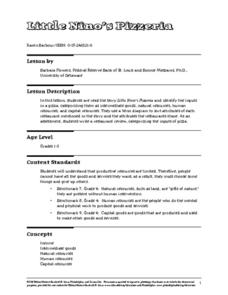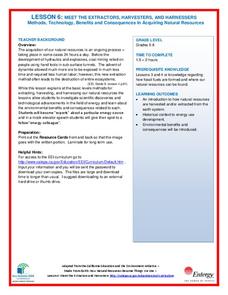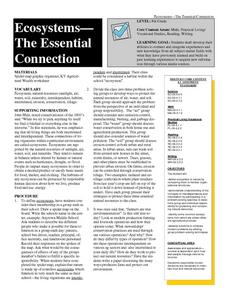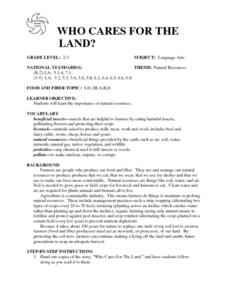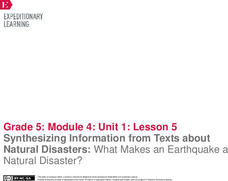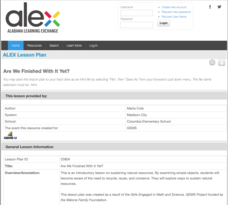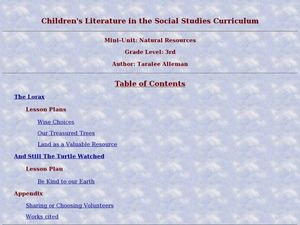Curated OER
Is That Natural?
Young scholars examine how they use and waste natural resources. They participate in a class discussion about natural resources, in small groups complete a worksheet identifying ways students misuse natural resources, and create an...
Illinois Department of Natural Resources
Section One: What is Biodiversity?
Four intriguing and scientific activities invite learners to explore the natural resources of their town. The activities cover concepts such as genetic traits, organizing species in a taxonomy, the differences between different species...
Federal Reserve Bank
Little Nino's Pizzeria
Engage your youngsters in basic economics by connecting the terms to dessert and pizza! After a discussion about intermediate goods and natural resources, learners read and connect a pizzeria to economic terms.
Education World
Edible Resource Maps!
Young scholars discuss resource maps and examine examples from library resources. Working in groups, they create edible resource maps by drawing examples, such as popcorn on the border of Iowa and Nebraska. Then they use cookies in the...
Illinois Department of Natural Resources
Section Two: Why is Biodiversity Important?
Explore soil, genetic traits, natural resources, and pollution in a series of lessons that focus on biodiversity. Kids complete experiments to learn more about the importance of varied genes and organisms in an ecosystem.
National Wildlife Federation
Meet the Extractors, Harvesters, and Harnessers: Methods, Technology, Benefits and Consequences in Acquiring Natural Resources
There are advantages and disadvantages to all sources of energy; the trick is determining which one has the least impact! Part six in the series of 12 has learners further explore energy resources. After reading information about one of...
Berkshire Museum
Nature Journaling: Experience the Outdoors Through Writing and Drawing
Step into the great outdoors and develop young scientists' skills of observation with a nature journaling lesson. Given a specific focus or goal, children practice making and recording observations of nature through written descriptions...
Channel Islands Film
Natural Resources, and Human Uses of Plants and Animals
As part of their study of the restoration projects on Santa Cruz Island, class members demonstrate their understanding of the connections among plant life, animals, and the actions of humans by crafting a model that reveals these...
Curated OER
Mini-Unit: Natural Resources
Students explore how their choices affect others. In this character development and ecology lesson, students debate choice-making issues. Students listen to The Lorax by Dr. Seuss and identify choices the characters made about tree...
Curated OER
Ecosystems-The Essential Connection
Students develop their abilities to solve problems both in school and in a variety of situations similar to that they have encountered in life. They define the term ecosystem in nature by comparing them to familiar organizational...
EngageNY
End of Unit Assessment, Part 1: Research and Response
Stay on target. The class reviews the learning targets for the unit and the end of unit assessment. Scholars then begin working on part one of the assessment answering how Canada's natural resources meet the needs of the people and how...
Curated OER
Renewable vs. Non-Renewable Resources
Fifth graders are introduced to the important topic of renewable, and non-renewable, resources. They are expected to be able to correctly categorize different types of resources as renewable or non-renewable. Another emphasis of this...
Curated OER
Kids Need Natural Resources
Third graders define renewable and non-renewable resources and give multiple examples of each type of resource. In this environmental science lesson, 3rd graders sort picture cards into two categories, renewable and non-renewable...
Curated OER
Disasters (Natural & Man-made)
Students chose a natural or man-made disaster, such as a tornado or an oil spill, to research using the assigned web sites. They choose a presentation type from a list which includes poetry, radio broadcasts, and safety brochures, to...
NOAA
Sustaining Our Ocean Resources
Lead young scientists on an investigation of fishery practices with the final installment of this four-part unit. Using a PowerPoint presentation and hands-on simulation, this instructional activity engages children in learning how fish...
Curated OER
N is for Natural State
For any pupils who live in the state of Arkansas, this would be a fabulous educational experience to help them get to know their state better. Through the use of activities in literature, art, mathematics, science, social studies, and...
Curated OER
Who Cares for the Land?
A very thorough lesson plan focuses on what plants need to grow and stay healthy. There are excellent reading activities and worksheets included in this fine plan. A terrific way to introduce a unit on plants and their needs.
EngageNY
Synthesizing Information from Texts about Natural Disasters: What Makes an Earthquake a Natural Disaster?
Are all disasters natural? Scholars reread Earthquakes! to determine what classifies these events as a natural disaster. They label earthquake facts as N for natural or D disaster to support their ideas. They then discuss academic...
EngageNY
Organizing Evidence from Multiple Informational Texts to Prepare for Writing: What Makes an Earthquake a Natural Disaster?
Fifth graders prepare for their end of the unit essay assessment by continuing to look at what makes an earthquake a natural disaster. They complete a graphic organizer and write a topic sentence. To finish, they view a model essay and...
Curated OER
Paper Makers
Learners make recycled paper out of scrap paper, water, and leaves. In this natural resources lesson plan, students learn about conservation of the forest and how we can use recycled paper to fuel our paper supply.
Alabama Learning Exchange
Are We Finished with It Yet?
Learners recognize the importance of natural resources and that we need to conserve, reuse and recycle them. In this conserving natural resources lesson, students are given one object and must create something with it. Young scholars...
Curated OER
A Differentiated Way through Think Dots
Students examine reasons that led people to explore, identify "West" as defined following Revolutionary War, explain importance of finding natural resources, develop time line of dates and events leading up to Lewis and Clark Expedition,...
Curated OER
Fourth Grade Social Studies
In this social studies worksheet, 4th graders complete multiple choice questions about the Constitution, natural resources, economics, and more. Students complete 25 multiple choice questions.
Curated OER
The Lorax
Third graders identify environmental problems. In this natural resources lesson students participate in several activities that support critical thinking about the environment and natural resources. The students write, list, and verbally...
Other popular searches
- Conserving Natural Resources
- Brazil Natural Resources
- Canadian Natural Resources
- New York Natural Resources
- Finite Natural Resources
- And Natural Resources
- Alberta's Natural Resources
- Natural Resources of Water
- Alaska's Natural Resources
- East Asia Natural Resources
- Conserve Natural Resources
- Natural Resources Michigan




